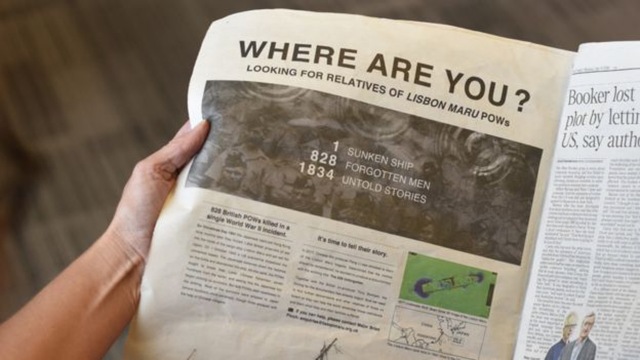
(Photo: BBC)
A strange full-page ad was printed in The Times, The Daily Telegraph and the Guardian, which are the three major British newspapers, in July 2018. It was asking for details on a man who is lost and looking for relatives of Lisbon Maru Prisoners of Wars (POWs).
Lisbon Maru? 828 forgotten men? 1,834 untold stories? What does this mean?
This information aroused people's interest and it was revealed the man who requested this advertisement is a Chinese man called Fang Li. Catching the eye of mainstream media platforms in the UK, Fang was interviewed by the BBC to see what he wanted and why he had such strong feelings for the Lisbon Maru POW.
Fang is a film-maker. In 2014, while producing the film “The Continent”, Fang traveled to China’s easternmost island - DongJi Island. It was the first time he heard about the “Chinese Dunkirk”, which happened more than 70 years ago, from the local fishermen.
The tragedy of the war which took place decades ago, deeply shocked Fang. “I cannot believe how many young lives are buried in the sea beneath me. The total death toll of this tragedy was more than half the amount of the Titanic, but how did people never hear of it?” In an interview with the BBC, Fang said, "While I was doing this I was totally touched by those young boys, the age of my son. So many of them lost their lives there."
"It is time to tell their stories," said Fang.
Fang decided that it was his duty to tell the story of the tragedy. "I think if people in my generation don't do it, maybe no one will." For him, it’s not only to tell the truth, but more importantly, the stories of the souls lost to the sea need to be recorded and not forgotten.
On October 1, 1942, Morley was one of more than 1,800 British prisoners of war being taken from Hong Kong to labor camps in Japan in the hold of a cargo ship, the Lisbon Maru. And then the Lisbon Maru was torpedoed by a US submarine about three nautical miles off the coast of Qingbang. Although the Lisbon Maru would take 25 hours to sink, the Japanese not only refused to rescue their prisoners, but, shockingly, even locked them in the ship’s holds to drown.
Those who managed to get off the vessel were callously machine-gunned, or run over by other boats. Hundreds of men were left helpless in the water, where scores were eaten by sharks. The nearest island, DongJi, was only a few kilometers away and it was the only hope for the POWs.
It was the first time residents of DongJi Island saw white people.
After noticing someone falling into the water, the fishermen on DongJi Island made a spontaneous decision. Many of them rowed their small fishing boats out and rushed to the site of the Lisbon Maru. Despite being fired upon initially by the Japanese, the fishermen decided to risk it all to save the foreigners. Eventually, almost 400 British soldiers were rescued from the sea and protected against Japanese gunfire.
Now we jump forward to 2018.
Fang discovered the location of the ship at the bottom of the ocean. Then he came up with the idea of finding the 400 British soldiers, telling their stories and documenting the history.
Fang soon put his plan into action. He paid for full-page ads to be placed in The Times, The Daily Telegraph and the Guardian, to find survivors and their descendants who remember the Lisbon Maru. The move shocked the British press, which soon followed up with interview requests from the BBC, Radio4 and The Times.
Fang’s input received a quick response. During a half-month visit, Fang visited more than 30 families of the descendants of the prisoners of war, and met Dennis Morley, then 99, one of the last known survivors from the Lisbon Maru. He also met a 98-year-old survivor who was still alive in Canada.
"Oh God, how many hundreds went under? Could be a 1,000-odd. I don't know. It's no good getting them out. They're all dead. They are probably bleached bones now," Morley said.
Richard Penny was also one of the British prisoners of war from the Lisbon Maru. He wrote a letter to his five-year-old brother in the prison camp that is still treasured by his descendants.
There is also a tombstone on DongJi Island, where the remains of two Australian soldiers are buried. The tombstone said "lest we forget".
Fang has spent millions on the documentary, he hopes to record 1,834 untold stories before people's memories are diluted by time. "The old people still living are nearly 100 years old, and
we really don't have much time. It could end up costing tens of millions of dollars, but with or without support, we still will manage to finish it. The documentary has received wide attention and support from all walks of life in the UK. Even Adele and U2's music producer Howie B said they could help Fang to make music for his production. Fang said, "Documentaries never make money, and I have no business aspirations. For all the members of the team, the only meaning and purpose is to remember the lives.
“More than 70 years ago, from Britain to China, people of different countries, races and languages worked together to defeat a common enemy.
“Both the brave fishermen and the prisoners of war made their own contributions to the victory of the war.”
A Chinese producer is campaigning for British prisoners of war who have died. The stories of the martyrs need to be told, and Fang's documentary is their unsinkable monument.


